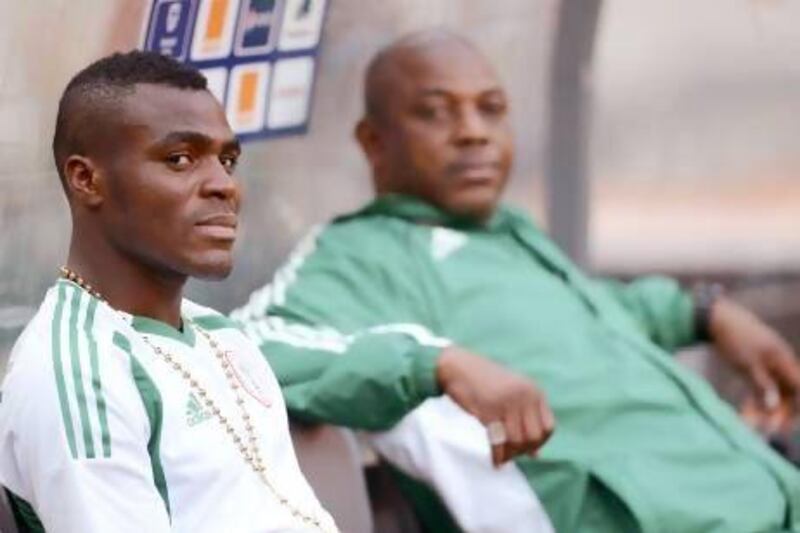JOHANNESBURG // Nigeria's leading goal scorer at the African Cup of Nations, Emmanuel Emenike, missed practice on Friday and trained gingerly on Saturday. He was being attended to by medical staff, head coach Stephen Keshi reported, betraying no obvious anxiety.
In fact, during Friday's session Emenike was in the team hotel in south Johannesburg, in the room Keshi has been using for team meetings.
The striker had an appointment with the barber, wore a long yellow bib spreading down to the floor from underneath his chin while he had his hair trimmed, his temples shaved.
Fully fit or not, Emenike intends to look his best for the celebration photographs, should Nigeria's players be leaping around Soccer City deep into a Soweto night.
A broad, noisy expectation is that Nigeria will be crowned Africa's champions for the third time, at the expense of a Burkina Faso, whose progress to the final in South Africa has been about belligerent resistance, rather than the blitzes that characterised Keshi's team as they moved through the knockout phase.
But the question marks over Emenike's availability, and the ankle problem that was Saturday still frustrating Chelsea winger Victor Moses, allows a doubt to form, the suspicion to grow that without that pair, the effectiveness of Nigeria's key weapon is potentially compromised.
The two men give Keshi's team much of their pace and bristle up front, the devices that steamrollered Mali in the semi-final and troubled Ivory Coast sufficiently that Keshi's Super Eagles could oust the pre-tournament favourites at the last-eight stage.
"We will make a decision on both Emenike and Moses in the morning," said Keshi last night.
"Our doctor and physiotherapist are working round the clock to get them better, and I see the situation improving.
"If they are 80 per cent fit, I will go with that. If not, we have 23 players here, and they are all good enough to step in."
Twenty-three players, that is, and a majority of the partisans in a sold-out crowd. Johannesburg has a significant population of resident Nigerians and they have swooped on tickets.
"The stadium should be packed," said Keshi, who captained Nigeria when they last lifted a Nations Cup, in 1994.
"It's the Nations Cup final. It's the biggest tournament in Africa."
For that, Keshi added, generously, he had been pleased to hear that Burkina Faso's most vibrant attacking player, Jonathan Pitroipa, would be taking part, after his suspension – imposed after a second yellow card in the Burkinabes' semi-final win against Ghana – was overturned.
"I applaud Caf [the governing body of African football] for their decision. The video clearly showed he did not deserve a red card. And fans come to a final to watch good football, so it is good that a good footballer like Jonathan will be there."
Nigeria know their enemy well. They met Burkina Faso in the opening match of Group C, 23 days ago, and drew 1-1. In some respects that game set the pattern for both teams.
Nigeria, through the swift combination play of their strikers, established a 1-0 lead through Emenike. Burkina Faso, persistent and patient, then found a way back.
Emenike has scored three times since, looking as sharp as his hairdresser's clippers until he pulled an upper thigh muscle straining for a shot in the 4-1 win against Mali.
Ahmed Musa, a star of the last Under 20 World Cup, would be the likely replacement should Emenike, or indeed Moses, not start. He too has the tearaway speed Keshi favours.
"Our plan has been to try and make sure we see plenty of the ball up front," said Ideye Brown, the striker who has operated with Emenike and Moses in a front three. "Whoever plays, we know we have speed there and we will try and use that."
Keshi expects no major revisions, whatever the personnel. "We must do what we know how to do best."
As for Nigerian weaknesses, they have much the more porous defence of the two finalists. Nigeria have conceded in four of their five matches so far, and goals against them tend to be scored late.
"The fact that Burkina Faso did that in the first game means they know we have been able to work to correct the errors we made then," said Keshi.
"The important thing is we maintain our concentration. But if we concede a single goal in the last 15 minutes and we end up winning 3-1, I won't be too worried."
Follow us
[ @SprtNationalUAE ]






